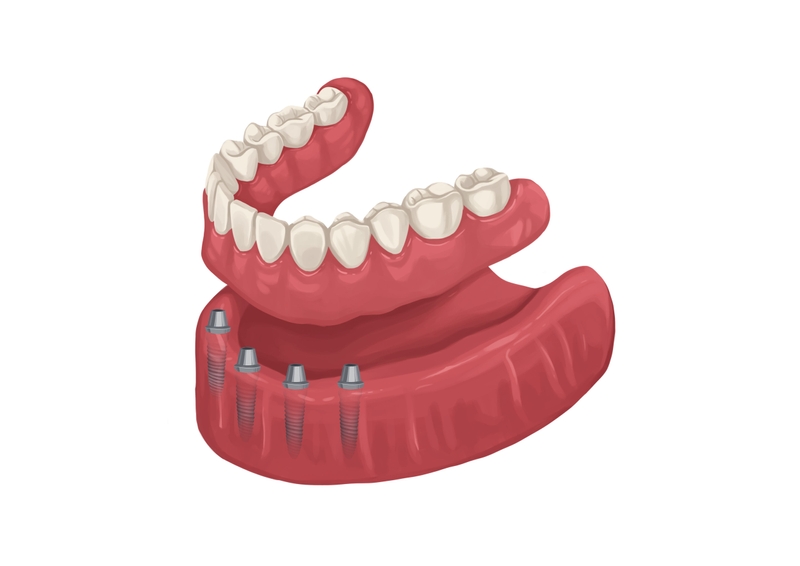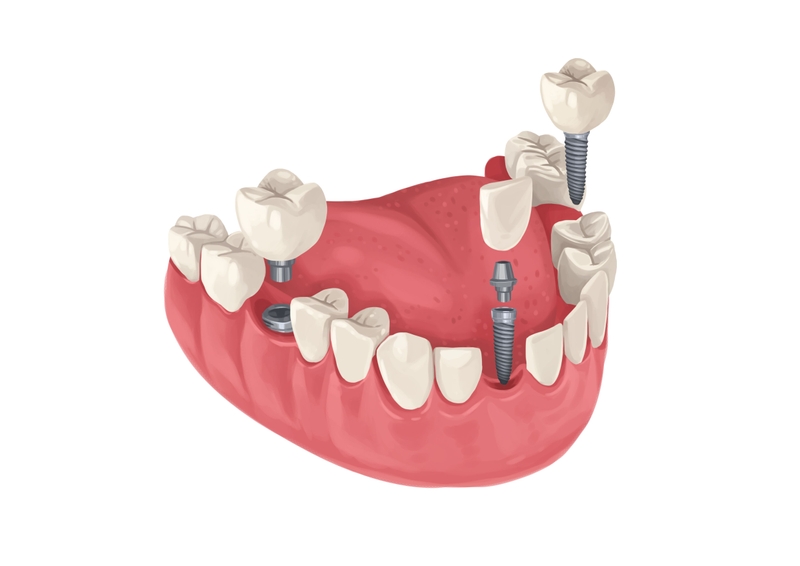- Clinical trials and dental societies may offer free or reduced-cost dental implants.
- Programs like Donated Dental Services and Give Back a Smile provide free dental care, potentially including implants, to specific groups.
- Medicare and Medicaid may cover dental implants in limited, medically necessary cases.
Use Authority Dental to find affordable dental care near you.
Looking for free dental implants? Learn about Medicare, Medicaid, clinical trials, and nonprofit programs that help seniors, disabled, and low-income patients near you.

Picture by Authority Dental under CC 2.0 license
Medicare and Medicaid
Federal and state programs may help finance associated procedures or provide free dentures. It is unlikely that they cover the dental implant procedure itself, unless under very particular circumstances.
Medicare and Medicaid are great examples of such initiatives.
Medicaid helps the underpaid in paying for medical expenses. It works differently in every state. Most commonly, younger people receive more coverage with lower copays than adults, and your implant needs to be medically necessary.
Medicare, on the other hand, is a national medical insurance program for people over 65 or those with certain diseases or disabilities. There are a few programs, but not all include dental care, let alone dental implant treatment, so make sure to check the fine print.

Picture by Authority Dental under CC 2.0 license
Because implants are considered cosmetic treatments by both dental and insurance specialists, getting a full refund is practically impossible. Nonetheless, it is always worth considering the potential options.
Harry Lee, DMD, admits: "The cost of dental implants is, without a doubt, the biggest hurdle for my patients. It is a tough conversation, because "free" implants are almost non-existent."
"The reality is that an implant is not a simple product; it is a high-tech medical device that requires a surgical procedure, specialized training, and a custom-made crown. I often explain that it is far more like an orthopedic joint replacement than a dental filling, and that is why the cost is what it is," he adds.
Free dental implant programs for disabled, seniors, and low-income patients
The following programs are mainly supported by volunteer dentists and labs, serving those who need dental care most. Some target specific social groups, so it is important to check which candidates they are looking for. Patients receive treatment free of charge.
Donated Dental Services
Donated Dental Services is a program endorsed by many respected associations, including the ADA. The Dental Lifeline Network funds them and provides free comprehensive services. Those are targeted at the elderly, disabled, medically fragile, and veterans.
Funded by: Dental Lifeline Network
Eligibility: elderly, disabled, medically fragile, veterans
Website: www.dentallifeline.org
E-mail address: administrator@dentallifeline.org
Phone number: 303.534.5360
Taking part in the program does not automatically mean you will receive implants. The decision on which treatment is best is always made by the surgeons performing the procedure. You can apply via post or online.
Here is what the process looks like:
Find your state and click on the application link.
Fill out every section to the best of your ability. Attach proof of disability if you have one.
Wait for a response. If you qualify, you will be put on a waiting list. If not, you will receive a letter of denial. This step could take several months, as there are many factors to consider.
The dental office will contact you to review your application and match you with a volunteer dentist.
He or she will determine your eligibility and the procedures to proceed with.
Give Back a Smile
Give Back a Smile is an organization that provides dental care to those who have been affected by domestic and/or sexual violence and have suffered mouth or teeth injuries. They are funded by the American Academy of Cosmetic Dentistry (AACD) Charitable Foundation.
Funded by: American Academy of Cosmetic Dentistry (AACD) Charitable Foundation
Eligibility: adult survivors of domestic and/or sexual violence
Website: www.givebackasmile.com
E-mail address: givebackasmile@aacd.com
Phone number: 800.543.9220
There is a $20 application fee. This can be exchanged for 10 hours of social work, making the treatment completely free. During a preliminary examination, it is determined what kind of dental work is needed, which may include implants.
Volunteers of GBaS do not treat any issues caused by neglect (such as cavities and gum disease) or fix any previous dental work. They focus on injuries to the smile zone that occurred at least a year ago. Exceptions are made if the abuser is in prison, jail, or deceased.
The applicant must also fulfill several requirements. This includes meeting with at least one of the following:
a domestic violence/sexual assault advocate,
case manager,
counselor,
faith leader,
therapist, or
doctor with experience in counseling survivors of domestic violence/sexual assault.
Here is what the application process looks like:
Download the form or call 800.772.4227, and one will be mailed to you.
Please fill it out and send it to: Mailing to Give Back a Smile, 402 West Wilson St, Madison, WI 53703
You can also fax it to 888.488.688.
If you qualify, you will be informed by mail. You will be referred to a volunteer dentist if there is one within 200 miles of you. It is your responsibility to schedule a consultation.
He or she will decide on your final eligibility and propose a treatment plan.

Free dental implants from clinical trials
Clinical trials are tests during which dentists practice new techniques and drugs.
During clinical trials, specialists may experiment with new materials or new types of crowns, abutments, or dental bridges. This means the procedure carries a certain degree of risk, but experienced practitioners perform it. Clinical trial candidates can get cheap or even free implants in return.
In order to find current clinical trials, use this search engine by ClinicalTrials.gov or this one by Patientwing.com. It is best to schedule a consultation or ask the program manager directly whether you are a candidate and to get an estimate.
Explore state and county dental societies
Local dental societies are a great place to find information on pro bono dental implants, other dental work, and clinical trials. Most societies have their own foundations. They help them fund grants for other non-profits and clinics. These, in turn, often offer free treatment to the less fortunate and other social groups.
You can use the ADA search tool to find contact information. Select your state and your local dental society. You can look through their page to see if anyone is currently funding any implant programs in your area.

FAQ
Is it possible to get dental implants for free?
Yes, it is possible to get dental implants for free or at a significantly reduced cost, but only in limited situations. Free implants are typically available through nonprofit dental programs, clinical trials, or volunteer-based initiatives that serve specific groups such as seniors, people with disabilities, low-income patients, veterans, or survivors of domestic violence. Eligibility requirements are strict, and implants are not guaranteed for every applicant.
Does Medicare or Medicaid cover dental implants?
Medicare and Medicaid generally do not cover dental implants as a routine benefit because implants are usually classified as cosmetic procedures. However, coverage may be available in very limited cases when implants are medically necessary. Medicaid rules vary by state, so eligibility depends on location, age, and medical need. Patients should always check their specific plan details.
How can I get free or low-cost dental implants near me?
Free or low-cost dental implants may be available through nonprofit programs such as Donated Dental Services, Give Back a Smile, clinical trials, or local dental societies. University dental schools are also a reliable option for significantly reduced-cost implants. Availability depends on eligibility, location, and program capacity, and waiting periods are common.
References
- American dental Association search tool
- Find Health Care: Indian Health Services
- HRSA Data Warehouse: Find a Health Center
- Search for Dental Programs
- Dental Lifeline Network official website
- Dental Lifeline Network State Programs
- Give Back a Smile program official website
- Give Back a Smile application form
- ClinicalTrials.gov
- Dental Implants Trials
Harry Lee, DMD
The programs that do offer free care, like Donated Dental Services, are incredible charities. I have colleagues who volunteer their time, and it is truly life-changing work for the few people they can help. However, it is crucial to understand these are not public-access programs. They are designed to help particular, vulnerable groups—like those with permanent disabilities or survivors of violence—and they understandably have long waiting lists.